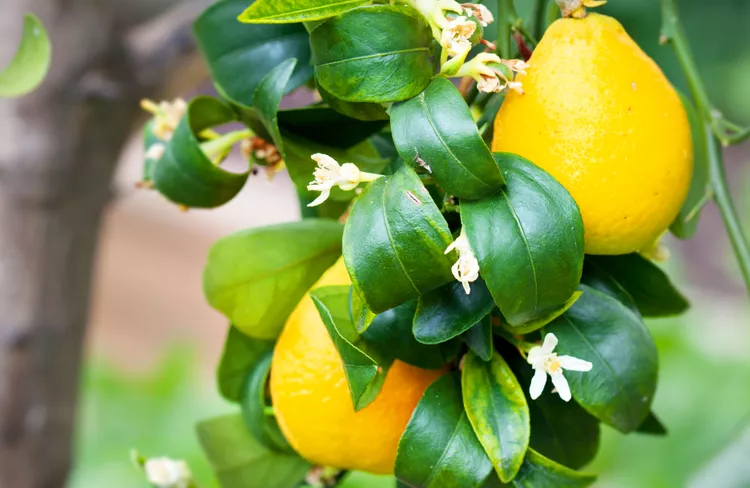Lemon Tree Leaves Curling? 5 Causes and How to Fix the Problem

When you see your lemon tree leaves curling, should you worry? A healthy tree's leaves don't curl so it's definitely something you should pay attention to. The good news is that most of the potential causes have a simple solution so you can restore your tree to health. Here's how to figure out what could be causing those lemon leaves to curl and how to fix the problem, whether you are growing your lemon tree in a container or the garden.
Tia Silvasy is a residential horticultural extension agent for the University of Florida, where she leads the Master Gardener volunteer program.
Causes and Solutions for Leaf Curling
“Leaf curling is a sign the plant is in distress,” says Tia Silvasy, an extension agent for the University of Florida. “It means your lemon tree needs your help.” Curling lemon tree leaves have several possible causes that can be treated or addressed after the problem is identified.
1. Insect Infestation
Insects, such as leaf miners, mites, aphids, and thrips, are the most common cause of lemon tree leaves curling, Silvasy says. The insects damage the leaf by sucking the juices from the leaf tissue, causing the leaf to curl and discolor.
“They’re often tiny insects you can’t see easily. They look like a speck of dirt. You’ll see the damaged leaves before you see the insects,” she says. Silvasy recommends spraying leaves—healthy ones and curled ones—with an organic pesticide like neem oil or insecticidal soap. Left untreated, the insects will kill your lemon tree.
Like all citrus, lemon trees benefit from pre-emptive, regular applications of pesticides. “We call it preventative spraying,” Silvasy says. “You should get on a schedule and spray your lemon tree every couple of months, especially when it has a new flush of leaves.” Inspect leaves regularly for insects or insect damage, and treat them as soon as you see trouble.
2. Drought
Too little water can cause lemon tree leaves to curl. When you notice curling leaves, check the soil moisture with a moisture meter or your fingers. If the soil is dry more than 2 or 3 inches beneath the surface, give the tree a good soaking.
“Lemon trees need consistent moisture, whether they’re in the ground or in a pot,” Silvasy says. She recommends watering in-ground, established lemon trees once a week. Potted lemon trees need to be watered at least twice a week.
3. Overwatering
Too much water can cause leaves to curl, too. “Overwatering causes root rot, which makes the leaves curl, sicken, and fall off the plant,” Silvasy says. Let the top 2 inches of soil dry out between waterings and get on a watering schedule to provide consistent moisture to the tree.
4. Extreme Temperatures
Lemon trees are hardy in USDA Plant Hardiness Zones 8-11. When they’re exposed to temperatures below 32°F or above 95°F, they can suffer leaf damage that causes the leaves to curl at the edges.
If your lemon tree is in a container, the solution to temperature extremes is simple: Move it to better conditions. If your tree is in the ground, protect it from extreme heat with a shade cloth or burlap cloth.
Protect an in-ground lemon tree from a freeze by wrapping it in frost cloth or, in a pinch, blankets. When temperatures soar, water the lemon tree more often to help it endure heat stress. Putting mulch around the base of an in-ground tree helps, too.
5. Nutrient Issues
Leaves can curl if the lemon tree isn’t getting the nutrients it needs, so fertilize the plant when you see leaf damage. Keep the tree healthy by using fertilizer regularly. Lemons and other fruiting plants are heavy feeders, so they need your help to get the nutrition they need to stay healthy. Silvasy recommends feeding lemon trees quarterly with fertilizer with a 6-6-6 NPK ratio. Granular fertilizer works well for in-ground trees, she says.
For lemon trees grown in containers, use a coated, slow-release fertilizer so the plant gets consistent nutrition. Plants grown in containers are in artificial conditions, so giving them the correct nutrition is trickier. Coated fertilizers provide a prolonged supply of food instead of a brief burst of nutrition.
Once you solve your leaf curling problem, keep your lemon tree strong, healthy, and resistant to future problems with consistent care. “Lemons like steady feeding, steady watering, and steady pest control,” Silvasy says. “Those are the three main things they need.”